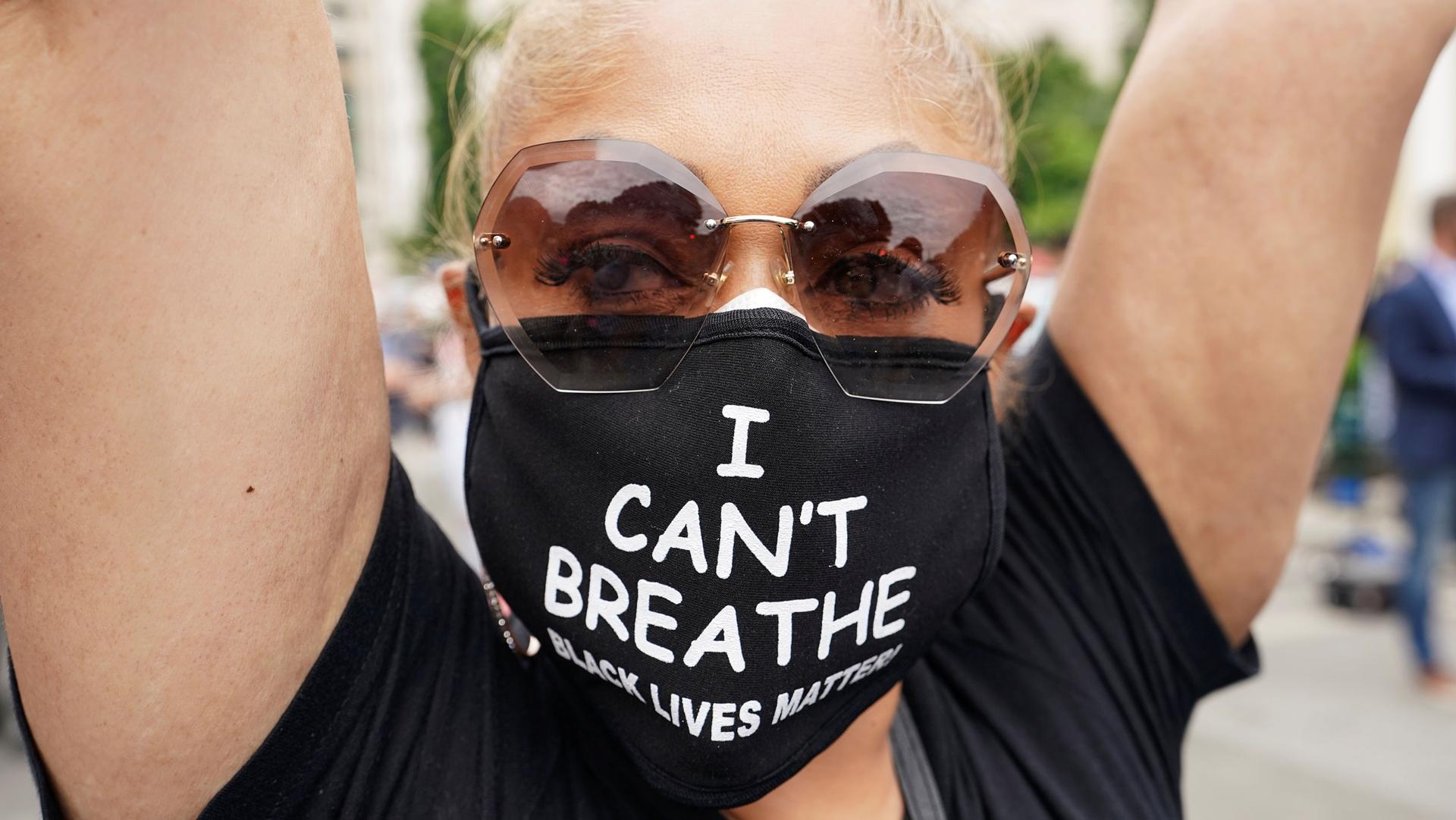A demonstrator wearing an “I can’t breathe” protective face mask gathers outside the White House as protests continue over the death in police custody of George Floyd, in Washington, DC, June 2, 2020.
In the US, the last few years of economic growth saw gains for lower-income families, but any hope for a durable narrowing of economic gaps may have been short-circuited by the coronavirus pandemic and the subsequent economic crash falling heavily on minorities.
The killing of George Floyd in police custody in Minneapolis last week may have been a catalyst for the anger that has spawned protests nationwide, but it was also in effect, the third major shock to hit in as many months, said Tawanna Black, chief executive of Minnesota’s Center for Economic Inclusion.
Before the recent surge in joblessness, “we saw the employment gap closing rapidly,” Black said. But “you were connecting people to low-wage jobs, and now you have displaced them. … What I am hopeful of is that we not just solve for criminal justice, but what’s required to get economic and social justice.”
The course of the pandemic and the financial fallout highlights how little has changed over a decade of growth that seemed to hold out at least the possibility of progress on narrowing racial economic divides.
For Dr. Michelle Morse, the disproportionate health impact of the pandemic on communities of color is also part of the equation.
“What we’re seeing right now is that the black community in America has been in crisis for a long time and, unfortunately, the crisis wasn’t impacting other people and so it was made to be invisible by some folks. But this is not a new crisis,” Morse said. “And I think what we’re seeing with the COVID-19 pandemic and its impact on communities of color is that these are the fault lines that have existed for generations. And the sources are the very social arrangement that puts white people on top and black and brown people on the bottom.”
Morse is a professor of medicine at Harvard University and co-founder of the Campaign Against Racism, a grassroots group of health workers around the globe. The World’s Marco Werman spoke with Morse about the intersection of racism and health in this critical moment around the globe.
Marco Werman: You’ve been working with health care workers around the world to mobilize against racism for several years now. Where have you done that work? Describe it and where it’s all landed.
Dr. Michelle Morse: In two years, I think we have made great progress in terms of deepening our connection as a kind of transnational community of health workers and activists. I think the systems of racial capitalism and structural racism that we’re trying to impact and upend and break down are going to take much, much longer. But some of the areas that we’re working on and where we have started to see just growing consciousness and action are things like the fact that kidney function is actually something that most laboratories in the US use corrector for the black race. And that corrector is rooted in a history of structural racism and racism in medicine, and actually is probably one of the drivers of why black people are less likely to see a kidney doctor early on, are less likely to get a transplant among other things. So, that’s just one area.
The George Floyd autopsy is another great example of an area where we have to recognize as health workers, we have been complicit in systems of oppression. And if we can’t see that, then we can’t fix it. And so to see a physician attributing George Floyd’s death to a history of hypertension and possible substances in the actual cause of death in this autopsy is appalling. We call it murder. Health workers have a role to play in making sure that that system does not cost us any more black or brown lives than it already has.
The systems that you were describing, do you see systems like that? Similar systems playing out in other countries?
Absolutely, yes. Haiti is a place that I have spent a good bit of time in, and it’s a place where this exact same pattern is happening. In the US we see black and brown folks so much more affected by COVID-19 because in large part of increased exposure — being more likely to be essential workers on the front lines without the protection needed. What we see in Haiti, for example, Haiti has 11 million people, but only 30 ventilators that are functional in the whole entire country. And so, again, that is not about Haitian inadequacies or failings. That is about a global economic system that makes it impossible for Haiti to have a functional health care system.
Doctor, as we see this confluence of pandemic and overt oppression of people of color — not to mention the disproportionate economic impact on people of color from the pandemic — what does this moment mean for you and others you’re in this field with?
We have to seize on this moment. We have to make sure that health workers are not just assumed to be the heroes of COVID-19, that we actually do the work of upending the sources of oppression that have led to these inequities and that we recognize that that takes time and that that takes constant pressure.
This interview has been edited and condensed for clarity. Reuters contributed reporting.
